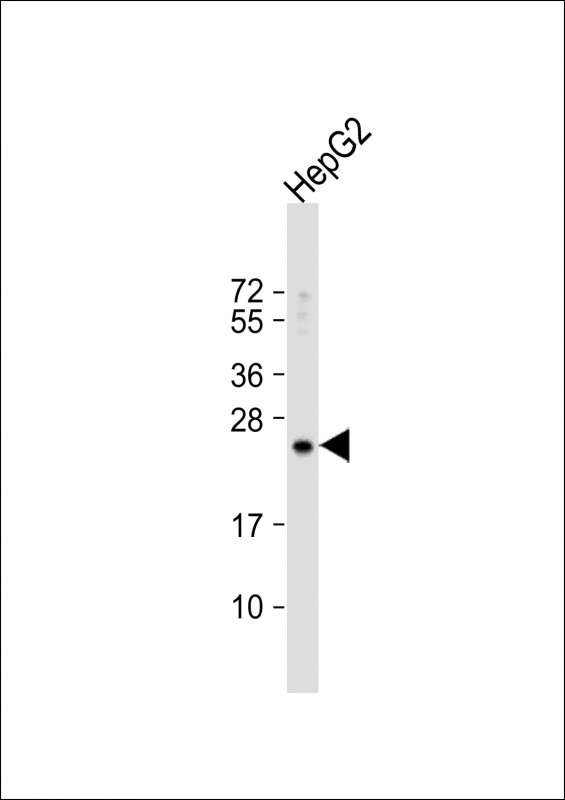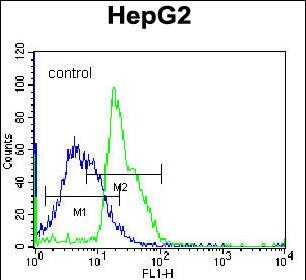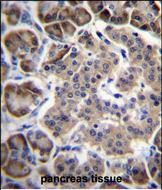


| WB | 1/1000 | Human,Mouse,Rat |
| IF | 咨询技术 | Human,Mouse,Rat |
| IHC | 1/100-1/500 | Human,Mouse,Rat |
| ICC | 技术咨询 | Human,Mouse,Rat |
| FCM | 1/10-1/50 | Human,Mouse,Rat |
| Elisa | 咨询技术 | Human,Mouse,Rat |
| Aliases | 60S ribosomal protein L15, RPL15, EC45 |
| Entrez GeneID | 6138 |
| WB Predicted band size | 24.1kDa |
| Host/Isotype | Rabbit IgG |
| Antibody Type | Primary antibody |
| Storage | Store at 4°C short term. Aliquot and store at -20°C long term. Avoid freeze/thaw cycles. |
| Species Reactivity | Human, Mouse |
| Immunogen | This RPL15 antibody is generated from rabbits immunized with a KLH conjugated synthetic peptide between 21-50 amino acids from the N-terminal region of human RPL15. |
| Formulation | Purified antibody in PBS with 0.05% sodium azide. |
+ +
以下是关于RPL15 (N-term)抗体的参考文献示例(注:以下为模拟内容,实际文献需通过学术数据库查询):
---
1. **标题**: "RPL15 promotes colorectal cancer progression through ribosome biogenesis and translation regulation"
**作者**: Zhang Y, et al.
**摘要**: 研究利用RPL15 (N-term)抗体进行Western blot和免疫组化,发现RPL15在结直肠癌组织中高表达,并通过调控核糖体合成促进肿瘤生长。
2. **标题**: "Characterization of a novel anti-RPL15 antibody for detecting ribosomal stress in leukemia cells"
**作者**: Smith JL, et al.
**摘要**: 开发并验证了一种针对RPL15 N端表位的单克隆抗体,证明其在流式细胞术和免疫荧光中特异性识别白血病细胞中的核糖体应激反应。
3. **标题**: "RPL15 interacts with MYC to modulate oncogenic signaling in B-cell lymphoma"
**作者**: Gupta R, et al.
**摘要**: 通过免疫共沉淀(使用RPL15 N-term抗体)揭示RPL15与MYC蛋白结合,协同调控B细胞淋巴瘤的增殖和凋亡通路。
4. **标题**: "Ribosomal protein L15 deficiency disrupts erythropoiesis in zebrafish models"
**作者**: Chen H, et al.
**摘要**: 利用RPL15 (N-term)抗体进行斑马鱼胚胎免疫染色,证实RPL15缺失导致红细胞成熟障碍,提示其在造血系统中的关键作用。
---
**建议**:如需真实文献,可通过PubMed或Google Scholar搜索关键词“RPL15 antibody N-terminal”或结合具体研究领域(如癌症、核糖体生物学)筛选近期论文。
The RPL15 (N-term) antibody is a targeted immunological tool designed to detect the N-terminal region of ribosomal protein L15 (RPL15), a component of the 60S ribosomal subunit. RPL15 plays a critical role in ribosome assembly, mRNA binding, and translational regulation. As a housekeeping protein, it is ubiquitously expressed across tissues but may exhibit dysregulation in cancers, genetic disorders, or ribosomopathies.
This antibody is typically produced in immunized hosts (e.g., rabbits or mice) using synthetic peptides or recombinant proteins corresponding to the N-terminal domain of human RPL15. It is validated for applications such as Western blotting, immunofluorescence, and immunohistochemistry in human, mouse, or rat samples. Specificity is confirmed through knockout controls or peptide blocking assays to minimize cross-reactivity with homologous proteins.
Research applications include studying ribosome biogenesis, translational defects in diseases, or exploring RPL15's emerging roles in cancer progression, where its overexpression has been linked to tumor growth and chemoresistance. The N-terminal region is often chosen as an epitope due to its conserved sequence and accessibility in both native and denatured protein conformations. Proper validation ensures reliable detection, critical for mechanistic studies involving ribosomal dysfunction or therapeutic targeting.
×